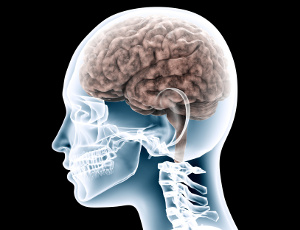Exercise and three nutrients improve neuroplasticity
 Neuroplasticity refers to the brain ability of brain cells to carry out structural and functional changes that are of vital importance to our development and health. It has been shown that neuroplasticity is impaired in connection with various diseases of the central nervous system, including such conditions as depression and dementia. In a review article that is published in Brain Plasticity, scientists have looked closer at how exercise, the Mediterranean diet, and nutrients like omega-3 and vitamin B12 can improve neuroplasticity by way of a protein called BDNF (brain-derived neurotrophic factor). Selenium is also known to be important for the formation of new brain cells, which can help prevent cognitive decline via other mechanisms.
Neuroplasticity refers to the brain ability of brain cells to carry out structural and functional changes that are of vital importance to our development and health. It has been shown that neuroplasticity is impaired in connection with various diseases of the central nervous system, including such conditions as depression and dementia. In a review article that is published in Brain Plasticity, scientists have looked closer at how exercise, the Mediterranean diet, and nutrients like omega-3 and vitamin B12 can improve neuroplasticity by way of a protein called BDNF (brain-derived neurotrophic factor). Selenium is also known to be important for the formation of new brain cells, which can help prevent cognitive decline via other mechanisms.
Brain plasticity also called neuroplasticity involves the learning process, memory, brain cell synthesis (neurons and glial cells), repair of damaged connections, and other compensating mechanisms. The brain remains plastic throughout life in order to adjust to different functions, including new ones.
Our neuroplasticity is affected by different environmental factors such as exercise, diet, and stress. It has already been demonstrated that exercise affects neuroplasticity through the release of different metabolites and proteins from muscles, the liver, and bones. These metabolites trigger the hippocampus in our brain to release a protein named BDNF (brain-derived neurotrophic factor). The activation of BDNF stimulates the following:
- the formation of neuronal synapses (nerve cells)
- neurogenesis – the formation of new neurons
- gliogenesis – the formation of new glial cells (support for neurons)
- angiogenesis – the formation of new blood vessels
- blood flow
- brain volume
- neuronal activity
This is why physical activity and exercise can improve cognitive functions and motor skills. In their review article, the scientists describe how exercise activates the liver-brain axis, muscle-brain axis, and bone-brain axis. They also describe how the diet and specific nutrients are able to activate the brain’s synthesis of BDNF and, subsequently, improve neuroplasticity.
Omega-3 fatty acids and vitamin B12
The brain consists largely of fatty acids, including the omega-3 fatty acids (EPA and DHA) that we get from fish oil, among other things. DHA is particularly important for the neurons and synapses in the brain. DHA is also important for the synthesis of different neurotransmitters. The new review article reports that several studies have shown how adults with higher blood levels of omega-3 fatty acids have a lower risk of developing mental and psychotic disturbances.
The researchers also mention several studies that have shown how omega-3 fatty aids can increase the synthesis of new neurons and improve cognitive functions and mood. DHA helps normalize levels of BDNF and reduces oxidative stress. Moreover, EPA (in particular) and DHA reduce local brain inflammation that can cause damage to neurons and other cells. Vitamin B12 is also important for the nervous system and memory. Low levels of vitamin B12 are associated with cognitive decline and brain atrophy, including hippocampal atrophy that affects our memory and sense of direction.
Also, it appears that the combination of omega-3 fatty acids and vitamin B12 work synergistically by increasing the hippocampal BDNF synthesis.
- Oxidative stress is an imbalance between harmful free radicals and protective antioxidants
- Free radicals are highly reactive molecules that cam damage cells and their DNA
- Ageing, smoking, poisoning, chronic inflammation, overweight, type 2 diabetes, and unhealthy eating habits are all able to increase the risk of oxidative stress
Mediterranean diet, other diets, and gut flora
The traditional Mediterranean diet also has a protective effect on the brain, according to the scientists. This is largely attributable to the large quantities of olive oil and vegetables, fish and meat combined with red wine in moderation. This type of diet is rich in omega-3 fatty acids, vitamin B12, and different polyphenols, all of which have an antioxidant and anti-inflammatory effect. The Mediterrannean diet also increases levels of osteocalcin, which can increase the synthesis of BDNF in the hippocampus.
Short-term intake of the keto diet with its high fat content also stimulates BDNF synthesis and neuroplasticity, whereas it has the opposite effect if it is consumed over a longer period of time. Diets are generally important for neuroplasticity. Our diet also affects our gut flora that is important for the brain and for our mood.
Selenium and neuroplasticity
According to other studies, selenium is also important for neuroplasticity but by way of other mechanisms. Apparently, selenoprotein P, a selenium-containing protein, helps the brain make new neurons. This is useful knowledge because selenium deficiencies are rather common but also because many older or disabled people are challenged when it comes to physical training, which is good for neuroplasticity.
Read more about how selenium boosts the formation of new brain cells
»Selenium boosts the formation of new brain cells«
References:
Marc Fakhoury et al. Exercise and Dietary Factors Mediate Neural Plasticity Through Modulation of BDNF Signaling Brain Plasticity 2022
Influences of Vitamin B12 Supplementation on Cognition and Homocysteine in Patients with Vitamin B12 Deficiency and Cognitive Impairment. Nutrients 2022
Odette Leiter et al. Selenium mediates exercise-induced adult neurogenesis and reverses learning deficits induced by hippocampal injury and aging. Cell Metabolism. February 3, 2022
Search for more information...
- Created on .








